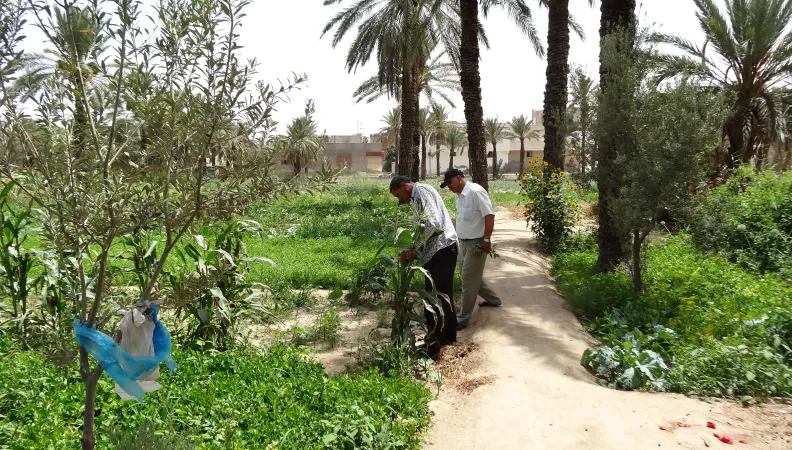Share the page
Adaptation to climate change for agriculture in the Maghreb region: ACCAGRIMAG
Project


-
Project start date
-
Status
Completed
-
Estimated date of project termination
-
-
Project financing date
-
-
Financing duration
-
3 ans
-
Type of program
-
FFEM
-
Global financing amount
-
87800000 €
-
FFEM financing amount
-
1500000 €
-
Project lead member institution(s)
-
AFD, Ministère de l'Agriculture et de l'Alimentation
-
Country and region
-
Africa
-
Location
-
Tunis
-
Type of financing
-
Grant
-
Beneficiaries
-
Royaume du Maroc - Ministère de l’agriculture et des pêches maritimes
-
Type of beneficiary
-
State
Reducing the vulnerability of rainfed agriculture to the impacts of climate change in Morocco and Tunisia.
Context
In Morocco and Tunisia, agriculture is a key sector for economic growth, food security and balance between territories.
Despite major investments, the performance of Moroccan and Tunisian agriculture remains highly dependent on rainfall, given the predominance of rainfed agriculture.
This situation of vulnerability to fluctuating rainfall is likely to get worse by 2030 and 2050 due to the projected climate change, which will lead to an increase in conditions of aridity and water stress.
The first available studies in Morocco and Tunisia indicate that without adaptation methods, climate change will have negative impacts on the development of agriculture: declines in productivity, declines in incomes, but also an increase in agricultural risk or a modification in territorial balances.
By contributing to managing the climate risk, the project aims to support and assist investment programs to benefit the agriculture sector.
Description
The project develops tools to secure the incomes of farmers and encourage the adaptation of farming practices to climate change, based on risk hedging instruments. It is implemented based on four components:
- Improvement and dissemination of knowledge: develop tools and skills for field and insurance operators in Morocco (Fès-Boulemane, Tangiers-Tétouan, Taza-Al Hoceima-Taounate), produce regional studies on the vulnerability of agriculture to climate change, regional/local adaptation strategies and practical guides on the evaluation tools.
- Experiment and disseminate innovative technologies: disseminate existing agricultural practices in Morocco in order to improve soil productivity through pilot operations in farming areas, in a context of the growing aridification of the climate: testing of conservation agriculture technologies by small and medium-sized farmers (genetic, water saving, agronomy, biofertilization…).
- Climate risk management: define effective management models by testing the feasibility of insurance in Morocco and a drought risk guarantee fund in Tunisia, construction of index methods for the assessment of yields (agroclimatic model), use of remote sensing to provide risk analysis, monitoring and management tools, parametric mechanisms to ensure insurance provides incentives for climate-resilient practices, sensitization to the financial viability of the insurance system in a context of growing hydro-climatic risks.
- Coordination, management and monitoring-evaluation: manage crosscutting actions in both countries, required for the proper implementation of the project, recruitment of international technical assistance, technical and financial monitoring and evaluation, communication and exchanges between Moroccan and Tunisian stakeholders.
Impacts
By increasing the resilience capacities of Moroccan and Tunisian agriculture to climate change, the project has a positive impact on food security, wealth creation and employment:
- In Morocco, improve knowledge of the impacts of climate change in the North regions and build the capacities for expertise and actions of stakeholders involved in the implementation of the agriculture recovery plan: the “Green Morocco Plan”;
- In Tunisia, secure the agricultural income of farmers benefiting from agricultural insurance.


